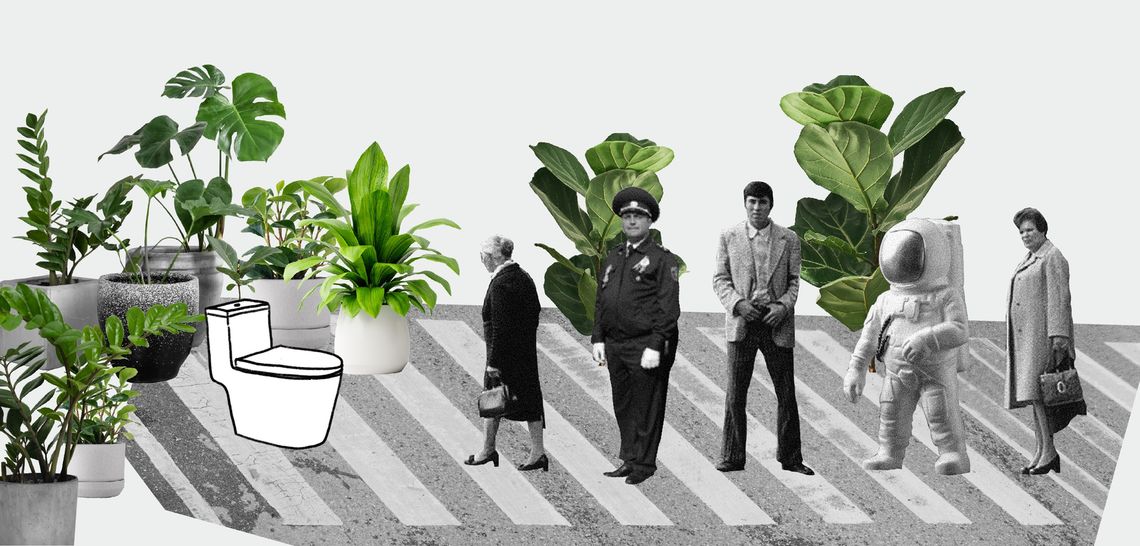
Illustration by Armine Shahbazyan.
When reflecting on the establishment of statehood, the development of democracy or the advancement of civilization we often do so in the context of civil society. It is in that collective space where, on the one hand, an individual with a high level of awareness and ability to think critically becomes a headache for the authorities, and on the other, the individual in their small personal domain involuntarily helps the authorities by assuming their role. What is more interesting is that most of the time no one even notices. And this is where the heart of the matter is.
Years ago, an impressive model of exemplary civic responsibility began circulating. Along a highway connecting several Scandinavian villages, for kilometers on end, one could see bags and boxes filled with produce, and next to them scales and jars full of change. Passersby would stop, take what they wanted, weigh it, then place the amount they owed in a container and if necessary, take their change. The extraordinary thing was that no one was overseeing the process. The farmer was out in the field tending to their crops and animals and not wasting time trying to sell their goods. The “integrity” of that trade was left to the conscience of the civilized consumer.
Everyone telling this story would end by asking a rhetorical question: “Would mutual trust such as this ever be possible in Armenia? And if a similar practice would be put to the test in the Ararat Valley, wouldn’t the product as well as the change simply vanish?”
When I bought my new car and was driving it from Poti back to Yerevan, I remembered one of Andrei Konchalovsky’s speeches where he cited Alexander Zinoviev’s mother. It was about something she had told her son when he was a schoolboy, something that impacted the future philosopher: “No need to stick your neck out about the existence of God. Simply live the way you would if you knew God existed.”
Hours earlier, when I was on my way from Yerevan to Poti, I realized that the driver was in tune with the classical algorithms of the road; driving as slow as possible when there was a speedometer or a police officer, and as fast as possible when there was no “danger” of being fined.
As soon as we got to Poti, we all rushed to the toilet to “relieve” ourselves after a long journey. People preferred the more civilized public toilet to having “to go” behind rows of trees or along the edges of valleys on the road.
Part of the protocol upon arrival, after the visit to the toilet, is picking up your newly-purchased car and getting on with the paperwork. There is also one other, inevitable moment. People approach you with an offer to buy your car’s catalytic converter [an exhaust emission control device that reduces toxic gases and pollutants such as carbon monoxide, nitric oxide, nitrogen dioxide into less harmful substances].
Just like that, on the go, one could get anywhere from 50 to several hundred dollars for the catalytic converter, depending on the make of your car.
If the catalytic converter is removed, your car’s functionality is not affected. In fact, it actually saves you on gas. The only thing that suffers as a result is the environment.
And here you face a dilemma: easy cash in your hand or the environment.
In reality, in the course of this operation that takes less than an hour, Zinoviev’s mother’s wisdom on individual (anonymous) responsibility as an indicator of the health of a society is best demonstrated.
Regulating laws, the existence of speedometers, oversight by law enforcement bodies are undoubtedly important but anonymous responsibility as a phenomenon remains the bedrock of civic culture: When you know your actions will not be punished, yet you continue to exercise strict personal responsibility.
When you use the toilet in someone’s home, it’s difficult to form an objective opinion of the people who live there because any member of the household who does not flush the toilet or freshen the air after using the bathroom won’t stay anonymous for long. Sooner or later they are “caught” by the other members, whereas it is the public toilet that is a true reflection of a given society. It is on that cracked-tiled platform where everyone is all alone in front of the toilet seat and before their own responsibility. Not unlike the voter with a sealed ballot in their hands, or the sinner in the confessional.
***
In 2020, Armenia’s Ministry of the Environment introduced a bill proposing to fine those citizens who have cars with no or dysfunctional catalytic converters 300,000 AMD and state officials 500,000 AMD. The amount of the fine was correlated with the average selling price of a catalytic converter. The law is pending.
Magazine Issue N8
Civic Culture

In order for a democracy to function properly, it needs a citizenry that participates in civic duties. Civic culture can also be defined as a set of political attitudes, habits and behavior on behalf of citizens who are aware of their political rights and how the decision-making process affects their lives and society. This month’s issue features stories about those rights and responsibilities, including individual awareness, the role of civil society and the role of the judiciary in defending human rights.

